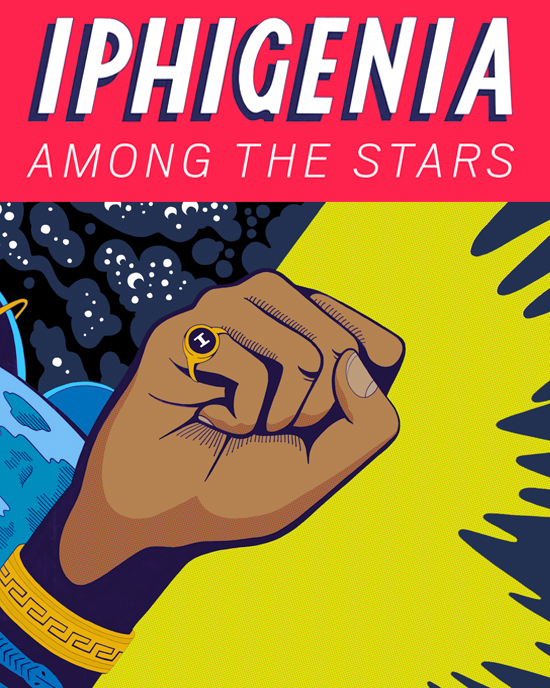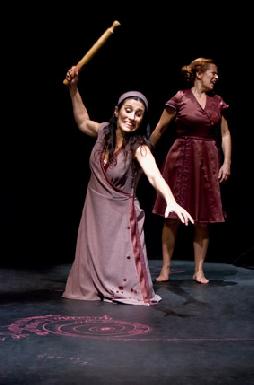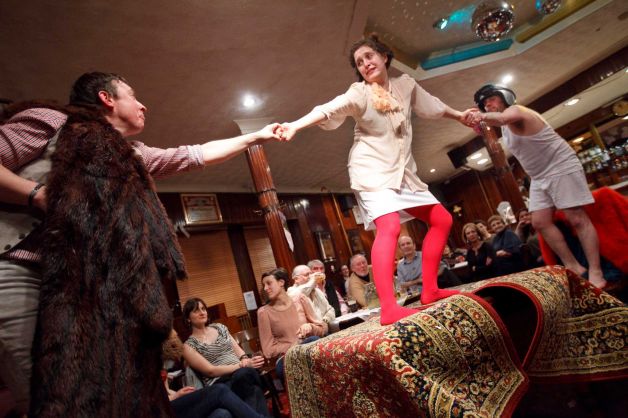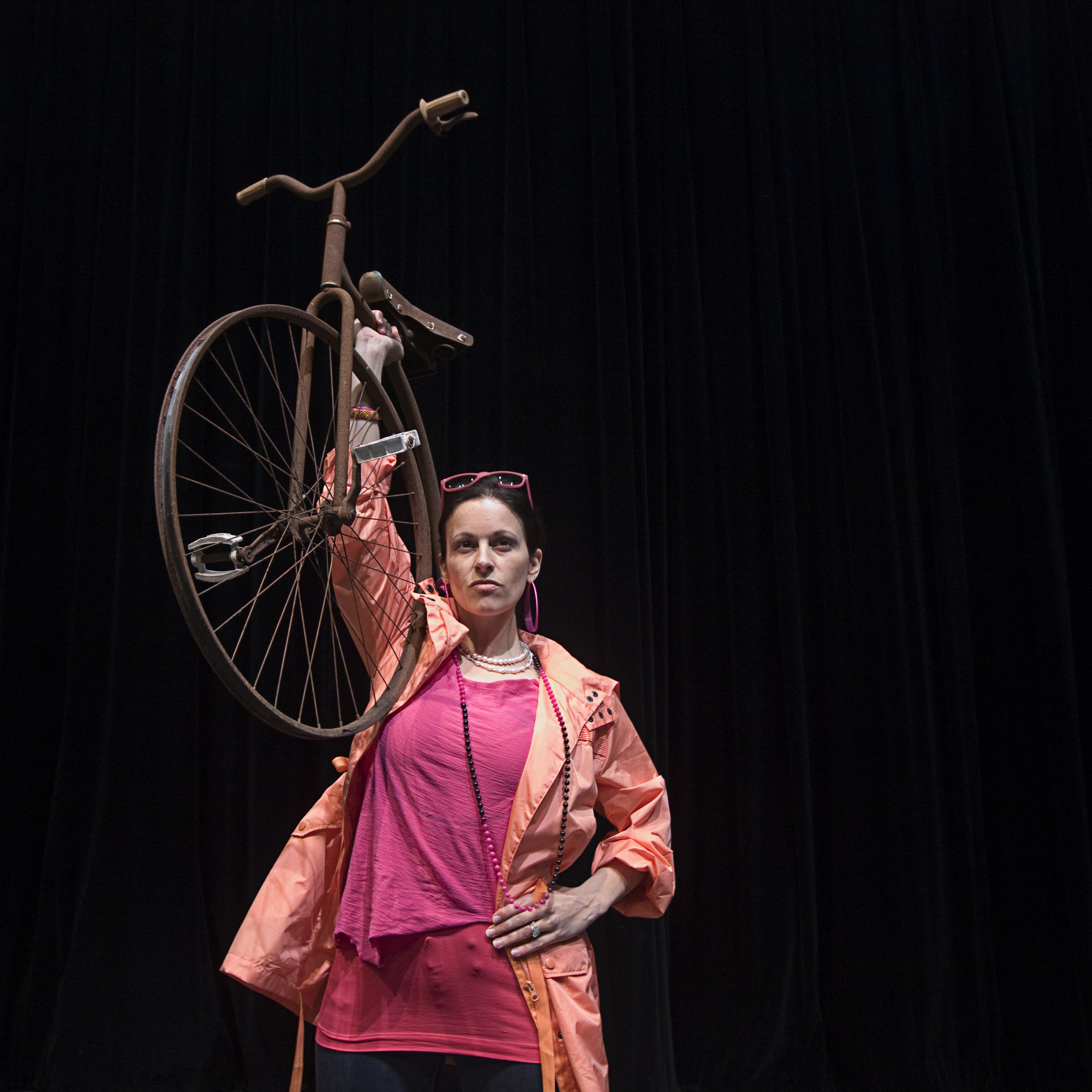Review of The Royale, Collective Consciousness Theatre
In certain contexts, “The Royale,” best-known perhaps from its memorable description in Ralph Ellison’s important and influential novel Invisible Man, was a humiliating contest that white men imposed upon black men—usually servants or simply people rounded up for the occasion. The black men—about half a dozen—were blindfolded and put in a ring to knock each other around to the spectators’ entertainment. The last man standing got to scoop up as much of the money thrown into the ring as he could carry.
When his trainer Wynton (Gregoire Mouning) tells Jay “The Sport” Jackson (Christopher Bethune) about his experience in “The Royale” in Marco Ramirez’s play of that name, it’s during the lead-up to Jackson’s heavyweight championship bout with Bixby, the white champ. Bixby has agreed to fight Jackson, a black man, on the condition that, win or lose, Bixby gets 90% of the take. Max (Ian Alderman), Jackson’s savvy manager, thinks Jackson can do better—if he bides his time and waits.
Jackson is through waiting. Convinced he truly is the best boxer living, Jackson knows that the sports press won’t acknowledge that fact so long as there’s an existing champ. And, since this is happening in the 1900s in the era of Jim Crow, the obstacles to a black man fighting a white man in the ring as an official championship bout are many. The fact that Bixby has agreed, even in such insulting terms, indicates the seriousness of Jackson’s challenge. Wynton tells Jackson he would “fight the son-of-a-bitch for free.”
Jay “The Sport” Jackson (Christopher Bethune) trains, in Collective Consciousness Theatre’s production of Marco Ramirez’s The Royale, directed by Jenny Nelson (photos courtesy of CCT)
In its production at Collective Consciousness Theatre, The Royale, directed by CCT’s Jenny Nelson, is a knockout. The small playing space is dominated by a very convincing cast that put across the drama, the wry humor, the sheer physicality, and, at last, the incredible tension leading up to that final bout. It’s a winner.
It would be hard not to root for Jackson right from the start. Based on the charismatic boxer Jack Johnson, the first black heavyweight champion, Jackson, as played by Bethune, does the original proud. He’s got great looks, a boyish smile, and the cockiness older viewers will remember from Muhammad Ali, a way of making every fight seem in the bag long before it happens.
When we first meet Jackson he’s in the ring with yet another pretender, called “Fish” Hawkins (Oliver Sai Lester), and the scene is played out with wonderfully precise timing. Rather than pretend to hit one another, the actors make arm movements and stamp their feet—which puts across a sense of the power of the punches, while the recipient reels. Mostly it’s Hawkins doing the reeling, but he manages to lend a few punches that impress Jackson—before the champ goes in for the kill. Which he does after toying with Hawkins in a credible, engaging manner.
“Fish” Hawkins (Oliver Sai Lester)
Jackson’s considerable charm is palpable as, after the fight, he gets past Hawkins’ resentment and guardedness and hires him as his sparring partner. Jackson, in his fine suits and expensive tastes, is a tough act to manage, and Alderman is a perfect fit in putting across Max’s carnival barker style, his dogged dedication, and his casual racism. At times, Wynton has to caution Jackson in his presumptions, and Mouning exudes canny wisdom. When Jackson hears there have been whites trying to get into arenas armed, he is more upset about the fact that Wynton and Max have teamed up to keep the fact from him than he is frightened by the threats. Jackson’s “you working for him or me?” to Wynton bites hard.
Jay “The Sport” Jacskon (Christopher Bethune), Max (Ian Alderman)
So compelling is this small cast in taking us into the manly world of prizefighting, we may tend to forget the prim, well-dressed woman seated at the back of the stage (Tamika Pettway). Eventually she will arrive—on the very eve of the championship fight—and throw shade upon all that Jackson has accomplished.
She’s not (as you might expect) a woman with a dirty secret from Jackson’s past, but rather his sister, Nina. And what she has to say is a heartfelt fear that, if Jackson wins, the sight of a black man rising above his station will bring down reprisals against innocent blacks and children, such as her sons, Jackson’s nephews. She sees Jackson, in his ambition and self-love, as concerned only with himself and his fame. But in Jackson’s view, the stakes are higher; he sees himself fighting as his sister’s champion, to strike a blow against cultural ideals restricted to white standards. In some ways, the fight between brother and sister eclipses the championship bout and The Royale dramatizes that quite well with Pettway giving Nina a single-minded purpose quite the match for her brother’s.
Nina (Tamika Pettway); Wynton (Gregoire Mouning), “Fish” Hawkins (Oliver Sai Lester)
To the victor goes the spoils in a Battle Royale, and here the victims are the victor’s too.
The Royale
By Marco Ramirez
Directed by Jenny Nelson
Assistant Director/Choreographer: Michelle Burns; Stage Manager: Ashley Sweet; Assistant Stage Manager/Propsmaster: Emily Charley; Set Design: David Sepulveda and Jamie Burnett; Lighting Design: Jamie Burnett; Costume Design: Carol Koumbaros; Sound Design: Tommy Rosati; Producer: Dexter J. Singleton
Cast: Ian Alderman, Christopher Bethune, Oliver Sai Lester, Gregoire Mouning, Tamika Pettway
Collective Consciousness Theatre
March 28-April 14, 2019












